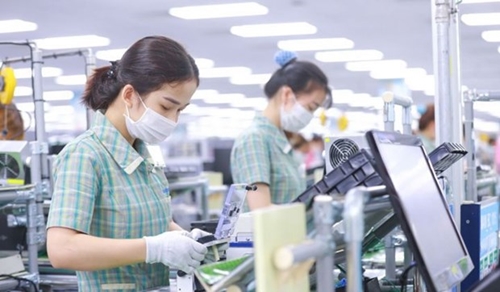In the second quarter, a modest decline of 4.5 points were recorded in European business confidence towards the Vietnamese market, with the current score of 43.5 reflecting prevailing market conditions, according to the report.
It said that businesses are prudently assessing the landscape, focusing on optimizing revenue and orders, with a marginal increase of 4% in the proportion of companies anticipating a decline in these areas.
    |
 |
|
The BCI shows a 9% increase in the number of business leaders who positively assess their business prospects for the third quarter of 2023 compared to their assessment for the second quarter. |
Additionally, there is a pro-active approach, as 7% more companies plan to carefully manage investments in the upcoming quarter. It is intriguing to note that despite these challenges, workforce planning remains stable, reflecting a resolute commitment to maintaining stability regardless of the prevailing conditions.
It underlined that despite the challenges, Vietnam continues to attract foreign investors, with 48% of the respondents expecting an increase in their company’s foreign direct investment (FDI) in the country next quarter. However, a total of 40% of the businesses express no plans for elevated FDI, marking a 4% increase from the previous BCI. Nevertheless, Vietnam remains firmly positioned among the top five investment destinations for over one-third of the businesses, underscoring its enduring appeal, it said.
In the current cautious business climate, respondents highlight regulatory reforms and the availability of skilled labour as crucial drivers for their companies’ growth, it said, adding that regulatory reforms are deemed the primary factor contributing to the growth in the service sector, while the manufacturing sector places significant emphasis on the availability of skilled labor.
The survey reveals that over half of the businesses surveyed have benefited from the European Union - Vietnam Free Trade Agreement (EVFTA). Among these beneficiaries, 35% of business leaders have reported gains from tariff reductions. Despite these gains, businesses continue to face challenges in fully capitalizing on the agreement, with administrative procedures and a lack of understanding remaining the main barriers to the full capitalization.
Commenting on the BCI, EuroCham Chairman Gabor Fluit said that Vietnam’s economy relies heavily on manufacturing and exports, and it has taken a big hit from the tough global situation. This decline in exports and orders has had a major impact on European businesses and the overall business community. The BCI clearly shows this current gloomy outlook, he said.
To address these challenges, the Vietnamese government has swiftly taken practical steps, particularly by expediting key infrastructure projects. EuroCham commends these efforts, which will surely bring a substantial long-term boost to the economy, he stated.
By taking prompt and comprehensive action, Vietnam can not only attract foreign investment but also ensure a resilient economy capable of overcoming future obstacles, he said, stressing that EuroCham is fully committed to providing support through ongoing dialogue and policy consultations every step of the way.
Source: VNA